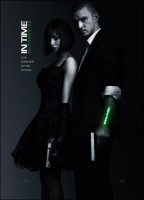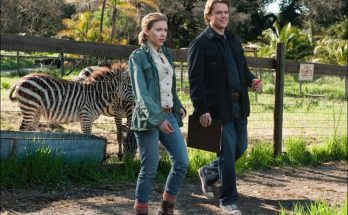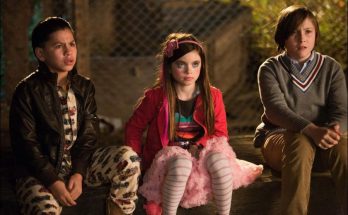In a retro-future when the aging gene has been switched off, people stop aging at 25 years old. However, stamped on their arm is a clock of how long they will live. To avoid overpopulation, time has become the currency and the way people pay for luxuries and necessities. The rich can live forever, while the rest try to negotiate for their immortality.
A poor young man is accused of murder when he inherits a fortune of time from a dead upper-class man over a century old prior to his death. He is forced to go on the run from a corrupt FBI-like police force known as the “Timekeepers”, as well as from a hoodlum-like middle-aged Mob called the “Minutemen”, led by a senior citizen named Fortis, who is 75 years old.
Introduction
Who dies in youth and vigour, dies the best. — Alexander Pope, The Iliad of Homer
Time is money. — Benjamin Franklin
Pick up a magazine or a newspaper. Turn on the television. Surf the internet…or go to a movie. It’s there, overt or subtle, permeating media – we are a culture obsessed with youth.
Niccol’s skill in bringing together big action set pieces and big ideas in unexpected ways, in fantastical yet recognizable worlds is in full evidence in IN TIME. “IN TIME is an action thriller,” Niccol points out. “I think people can enjoy it on that level. They’ll go for the stunts, action, car chases and to see Amanda Seyfried wielding a gun, which she does brilliantly! But I think audiences will appreciate some of the ideas and themes we explore, because IN TIME does say something about our desire to stay young forever. While we can’t turn off the aging gene, as we’re able to do in the film, we do go to a lot of extremes to stay young.”
Niccol, a New Zealander, had honed his filmmaking skills in London directing commercials, before arriving in Hollywood with a splash as writer and director of Gattaca. The following year, he penned The Truman Show, which garnered him an Academy Award® nomination for Best Screenplay Written Directly for the Screen.
Niccol’s ability to bring together bold, new ideas with instantly relatable ones resonated with producer Eric Newman. “Like all of Andrew’s work, his screenplay for IN TIME really transported me, and I found myself in a world he had created,” Newman recalls. “It was a parable, a socially conscious work and yet, like all his work, it was incredibly entertaining, fast-paced and brilliant.”
Executive producer Andrew Z. Davis was eager to work on a film that was both a great ride and a social commentary: “IN TIME has resonance. Everyone can relate to a story about haves and have-nots, which is essentially what the story’s about. But, at the same time, it has action, romance, and a political message. And as everyone knows, a good thriller has to have a ticking clock, whether you’re waiting for a bomb to go off or a hostage to get rescued. In this movie, it is actually a clock; time is the great discriminator.”
Executive producer Kristel Laiblin was taken with the intricacies of Niccol’s work and the flourishes in his storytelling: “Andrew’s way with telling a story is economical and evocative. The world of our hero moves quickly; no one wastes time. At the opposite end is the world of the wealthy, where you’d never see anyone timing out. You can spend time however you want—a leisurely game, like cards, which no one would play elsewhere. They are completely different worlds and Andrew created them both vividly in a few pages.”
Amy Israel, an executive producer on IN TIME, was at New Regency Productions when Niccol brought in the project and she, like all of her colleagues, sharply remembers her first read: “Andrew’s script was original, had a big idea and had a compelling emotional story at its core. It was special, and we all knew that from the start. And the story took place in a world not unlike our own, sort of an alternate reality. Here, time is currency, and everyone is born with a body clock embedded on the wrist. At the age of 25, when the frontal lobe of the brain and the body are considered fully matured, that clock starts ticking – and you have one year to live. Either you’re born into time, and have no worries, or you begin working your life away, literally.”
Will Salas is the story’s hero. He lives in the poorest region, or time zone, named Dayton. He rarely has more than 24 hours on his body clock, and must work every day at a factory to afford another day of life. For his mother, Rachel, it is the same story, as it is for all in hard-scrabble Dayton. But far from desolate, Dayton is alive with color, sound, speed, music, urgency…and crime. Gangs called Minute Men are always on the lookout for ways to steal time, and ending a life in exchange for a few hours means nothing to them. (Stealing time is a simple matter of strength; the aggressor literally gets the upper hand, placing his time clock directly over the clock of the victim, strong-arming the mark into an arm lock.)
When Will protects the wealthy interloper Henry from a crew of Minute Men intent on timing him out, Henry makes a present to Will of a century of time. But as time is currency and painstakingly tracked as such, the movement of such a large sum within the confines of Dayton alerts the authorities, the Timekeepers. Moreover, Will is falsely accused of murder, which triggers a veteran Timekeeper named Leon to begin a relentless pursuit of Will.
Without an overriding plan (apart from avoiding capture by the Timekeepers), Will decides to spend his time in the richest zone, New Greenwich. In stark contrast to Dayton, nothing moves quickly here; time is a luxury all residents can afford, since most have hundreds, or even thousands of years to live. But relative immortality comes at a price, and all are fearful of theft and injury – “the poor die and the rich don’t live,” Will observes. It soon becomes apparent to Will that in order for a few to live, many must die, to keep the scales of rich and poor balanced. Maybe he can use his time to do some good?
But New Greenwich does have something that attracts Will – Sylvia Weis, daughter of the super-wealthy Philippe Weis. When the Timekeepers attempt to apprehend Will, he takes Sylvia hostage, and what starts as a flight from the law becomes a high stakes game to change the rules of this not-so-brave new world, with two lovers on the run at its center.
Producer Eric Newman notes the speed with which Niccol introduces this world in his script. “The biggest challenge in a movie like this is how do we sell the world?” Newman explains. “Andrew did it in the first three pages of the script. Will Salas wakes up, walks into a room, and there is a beautiful 25-year-old woman and he says, ‘Hi, Mom.’ And he’s got this counter on his wrist, and it’s counting down. And his mother gives him 30 minutes for lunch. You understand immediately that Will has 22 hours to live [unless he can obtain more time]. And that’s his mother, even though they appear the same age, and she just gave him time to buy a decent lunch. That’s brilliance in economy, which is difficult to accomplish in a script.”
Casting
Seeking actors for a movie where everyone is or remains 25 may sound like a straightforward task, but that was not the case. Though true, on the outside, the characters look 25, on the inside, they are older… some in their 30s, 50s, 60s, some over 100. And that needed to be conveyed in performance, without benefit of makeup, effects or CGI.
“All the actors had to look around age 25 because in the story, that’s when the aging gene switches off,” Niccol elaborates. That specific age was not chosen arbitrarily. “It’s the age we fully mature, when the frontal lobe of the brain fully develops,” the filmmaker continues. “It is the part of the brain that controls impulse and reckless behavior. Rental car companies know this; they will not rent a car to somebody under age 25. There are characters in the film who are chronologically 100 years old, so I had to search for ‘old souls.’ Only certain young actors have the ability to play a senior citizen in a 25-year-old body.”
One actor who jumped at the chance to play an “old soul” was Justin Timberlake. It was Timberlake’s early rise to stardom that helped convince the filmmakers of his fit for the character of Will. “I love Justin’s work ethic, which is one of the important traits he shares with his character, Will Salas,” says Niccol. “It was actually very fitting that Justin plays Will. Will has to wake up every day and go to work or die, and I don’t think Justin himself has taken a day off since he was 12 years old. There is no reason he won’t be a successful action hero [as Will] because he seems to be great at anything he turns his hand to.”
Adds Eric Newman: “Justin has been an adult since he was 17 years old, when he was a superstar. He didn’t have a conventional childhood, and he carries that with him. The character of Will is one who probably never had a childhood either because, in this world, you are born with a clock on your wrist, spending the first 24 years of your life waiting for that clock to start. And when it does, you have less than a year to figure it out; you’re constantly faced with your own mortality. I think Justin has continually worked harder than everybody else, and he brings that to his acting as well. I think Justin and Will both have a similar ‘work or die’ ethic; they’re wired the same way.”
Timberlake, a longtime fan of action films, embraced the opportunity to play a character whose heroics are grounded in reality and a contextual richness. “When I was a kid, some of my favorite movies were action pieces like First Blood, The Fugitive, and Die Hard,” says Timberlake. “The one thing I loved about those specific movies was that the protagonists were everyday people placed into extraordinary circumstances and doing extraordinary things.”
Will’s heroics are triggered by an easily relatable factor. “Will has grown up with essentially nothing,” Timberlake notes. “He wakes up every day and goes to work to stay alive. Through a series of events, he decides that he’s not going to take it anymore, and takes it upon himself to try and change the way things work in this world.”
“Will grows up in Dayton, which is somewhat of a ghetto. It’s kind of ironic that the word ‘day’ is in its name, because most of the citizens only walk around with a day to live. So the day-to-day life in Dayton is quick. People don’t have time to walk slowly, so they run, almost all of the time, to where they are going, and they’re constantly eating and drinking on the run. They don’t have time to spare or to waste. Everything’s frenetic and alive, in a kind of dangerous yet beautiful way. When your back is up against the wall and you don’t have a choice, you make revisions and you live your life the way that it has to be, to survive.”
Timberlake reserves special praise for Amanda Seyfried, who portrays Sylvia, his unwilling (at first) partner-in-crime. “There are people that see the world the same way Will does. At the end of the day, I think he just wants what is fair. I think, through Sylvia, Will discovers that there’s something bigger he could be fighting for. It becomes kind of a Robin Hood tale at that point, once they pair up; like any young people put in high risk situations, they become enamored with each other. And working one-on-one with Amanda has been great. I feel like we’ve really captured something special between those two characters.”
While Sylvia may become someone who inspires Will to take up the fight, she certainly does not start out that way. The nascent darker side of Sylvia was something Seyfried could bring to the fore, per Andrew Z. Davis: “What I love about Amanda is there’s a sweetness about her but, at the same time, she has an edge. I don’t think audiences have really gotten to see her edge that much in movies.”
“Sylvia is the girl in the gilded cage,” seconds Amy Israel, “trapped by her situation; she questions it because she isn’t sure everything is exactly the way it should be. But she’s kept in that system by her father and her circumstance, all the time yearning for more, wanting to take risks. But no one in New Greenwich takes risks.”
“Sylvia dreads her life every day,” reveals Amanda Seyfried. “She wants to have some kind of adventure. In a world like this, you spend so much time trying to protect your life that you don’t really end up living.
Everybody has bodyguards
They all eat very well, but very little, they don’t drink or smoke; it’s mundane. Sylvia just isn’t made for this kind of life. She gets her wish for a different life when Will takes her away.”
Will’s first appearance in the richest time zone is telling. He is clearly out of place, but there is something unmistakably attractive about him, at least for Sylvia. Seyfried continues, “He comes into New Greenwich and in walks this almost larger-than-life guy. Once Will and Sylvia get to Dayton, everybody runs, because they’re fighting time. Everyone moves so fast, but there’s a sense of excitement there, and it’s liberating because they live day-to-day. You’re wired differently there. What’s important is the now.”
It’s that very change of environment that signals a turning point for both Will and Sylvia. Timberlake offers, “The first half of the movie is really Will’s arc: halfway through, he makes the decision about what he is fighting for, he finds a bigger purpose. The second half of the film is a huge arc for Sylvia. She comes from time, and underestimates what Will values, as he does with her. It’s one thing, to come from nothing and to try to fight for what’s right; it’s another thing to have it in your hand and realize that, maybe there’s a portion of it you don’t deserve. There’s humility in that acceptance, and that’s what transforms her.”
In addition to the journey of Sylvia, Seyfried was attracted to many of the things that captured Timberlake’s imagination about the world Niccol had created. “Andrew’s one of a kind, and I wanted to be a part of this. It’s so very different, but at the same time, it has so many parallels to the way we live, which is why it’s so smart. And I have to admit, getting to hold a gun and kick some butt also sounded like a blast.”
Sylvia and Will are running for their lives – not just to find enough time to make it through another day, but from the Timekeepers out to capture the fugitive duo. “Timekeepers keep the system running; they actually keep time,” says Niccol. “And our principal antagonist, Timekeeper Leon, is not really a villain. He is just a bureaucrat, an authority figure who has allegiance to no one, rich or poor. His only allegiance is to minutes and seconds.”
Leon is not wealthy. He has a steady job, and he’s managed to keep at it long enough to live 35 years beyond his built-in time out. He believes in the system because he has to. Leon is Will’s opposite number. Will is young enough to believe that there may be hope in the future – a concept Leon may have held, briefly, many years ago. Leon is now old enough to know better, and believes (or has to believe) that you are either working for the system, or you need to be eliminated.
For the role of the Timekeeper Leon the filmmakers cast another “old soul,” Cillian Murphy. Murphy acknowledges the circumstances of his character – “he’s a cop charged with keeping this system going” – but the actor finds the deeper layers of Leon more compelling to play: “What’s great about the character is that he is a contradiction, because he’s actually from that same ghetto where Will lives. Deep down, he knows that it’s a corrupt system, and yet he’s decided to accept that and pursue his goal of keeping time. He’s a very kinetic and focused character, and for him it’s just about constantly moving forward. I think he’s suppressed all of his past. What I liked about the writing is that Will and Leon, they’re the flip side of each other. It’s just different paths having been taken. This is the path he’s chosen, and he suppresses all of the misgivings and issues he has with this system. He’s tried to leave them behind over the course of his life.”
As with the classic archetypal chase – the hunter and the hunted – so beautifully realized in, for example, The Fugitive, a bond forms as the chase quickens. Murphy adds, “Not only does Leon realize he’s from the same side of the tracks as Will, but there is a sense of history; Leon knew Will’s father. I think over the course of the story, they gain a respect for each other.”
Part of the menace of Dayton, apart from the possibility of timing out should one not amass a day’s wages, is the presence of Minute Men, who are thieves out to steal time. Alex Pettyfer portrays Fortis, the leader of the Minute Men – a refined 75-year-old psychopath (who of course looks 25). “Because of the character’s age, he’s quite articulate,” says Niccol. “He has more sophisticated taste in clothing than a younger man would have. That makes him seem different from the younger characters.”
Pettyfer offers, “Fortis is a bruiser, though not without a certain elegance. And he’s just a complete psycho, and crazy-hungry for time. I think the scariest thing about him is that he feels he has nothing to lose. He just doesn’t care. He’s just now gone completely insane and is on a rampage for more time.”
The actor enjoyed his trip to the dark side, finding it a liberating experience: “You can’t do everything you want playing a villain, but you have room to create. And I think that’s the most attractive thing about playing a character like Fortis; it’s that you can build so many layers with him.”
For the part of Rachel Salas, Will’s mother, the filmmakers turned to Olivia Wilde, who has experienced an explosion in her career with such films as Tron: Legacy and Cowboys & Aliens. “Olivia’s not going to be able to play a 50-year-old woman for another 30 years, and I think there was something challenging about that and something fun for the actors and us,” says producer Eric Newman. “The part required an actor with a maturity beyond her years to play Rachel, and Olivia has that quality,” adds Niccol.
Wilde, who is a few years younger than onscreen son Timberlake, says, “I was very attracted to the idea of playing someone who was a very old soul in a young person’s body. And I thought, how interesting, to play someone who’s 50-years-old, who’s had this long life in a world where it’s very tough to have a long life. I mean, you wonder what she’s been through in order to survive for 50 years.”
Wilde was equally impressed with Niccol’s vision. “Surprisingly, Dayton is a very lively, colorful and sexy place,” she enthuses. “You’d think in a dystopian society everything would be kind of gray and drab and sad. Instead, although this world has reached the boiling point of vast inequality and misery, there is this incredible life, and particularly in the poorer side of town.”
Someone at the far opposite end of the spectrum from Will and Rachel, and for whom “Dayton” is only a concept in a ledger, is the tycoon Philippe Weis, Sylvia’s father. The Weis family fortune was built on a chain of time lending stores, which charge exorbitant interest on the time borrowed by Daytonians desperate to stay alive. Vincent Kartheiser plays Philippe and, with less than a decade between his and Seyfried’s actual age, the “Mad Men” star met the challenge of playing her father, who is actually, internally, well over 100.
Says Kartheiser: “Where you or I might say, ‘Well, you only live once,’ or ‘Live today like it’s the last day of your life,’ Weis and his friends and family don’t believe there will be a last day. Weis and his ilk have centuries to accomplish their goals, leaving them at best unmotivated.”
Weis has no trepidation about his fortune – as long as there are people with less than 24 hours to live, there will be customers. And it’s definitely a fixed game, in Weis’ favor, of course. Says Kartheiser: “The interest rates Philippe charges change in accordance with how much the ‘haves’ want to control the ‘have-nots.’ So, when people need to die, to avoid overpopulation, the interest rates will jump, so that they can’t afford to borrow any more time, or even pay the interest on the time they’ve been loaned. And this is one loan you can’t default on, if you want to keep on living.”
Will’s best friend, Borel, is a troubled soul unable to deal with these restrictions. Johnny Galecki, who portrays Borel, notes that his character and Will “share the same political ideologies, but I think Borel’s a little too sensitive for this world. This life clock is his Achilles’ heel; it haunts him. So he helps himself along by self-medicating, maybe a bit too much. He has a wonderful wife and a beautiful baby and if it weren’t for them, he probably would have been gone a long time ago.”
Henry Hamilton is an enigmatic stranger who wanders into Will and Borel’s local watering hole, flashing more than a century of time on his wrist. Such a catch quickly attracts the Minute Men, but Will steps in to protect Henry. In exchange, Hamilton not only rewards Will with time, but also with the truth and deepest secrets of their respective zones.
Matt Bomer, of the hit USA series White Collar, plays Hamilton. “Hamilton is sort of like that character in a Dickens novel, who imparts information to the protagonist that sets him on a new course. Henry wants to change things, but he doesn’t know how to. He’s 105 years old, lived a full life, and now he wants to end it. In Will, he finds somebody who can think outside of himself, who has the courage and the moral fortitude to actually affect change. So he gives him the gift of years, hoping that this brave soul can make a difference.”
In Time
Directed by: Andrew Niccol
Starring: Justin Timberlake, Cillian Murphy, Amanda Seyfried, Vincent Kartheiser, Olivia Wilde, Laura Ashley Samuels, Zuleyka Silver
Screenplay by: Andrew Niccol
Production Design by: Alex McDowell
Cinematography by: Roger Deakins
Film Editing by: Zach Staenberg
Set Decoration by: Karen O’Hara
Costume Design by: Colleen Atwood
Art Direction by: Vlad Bina, Todd Cherniawsky, Priscilla Elliott, Chris Farmer
Music by: Craig Armstrong
MPAA Rating: PG-13 for violence, some sexualty and partial nudity, and strong language.
Studio: 20th Century Fox
Release Date: October 28, 2011
Hits: 368









